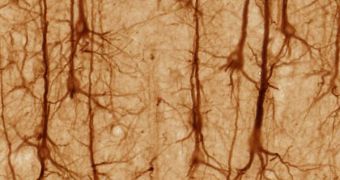“Mirror” neurons are a special type of brain cells, which experts believe help people understand the actions and intentions of those they come in contact with. Their contribution to the development of personalities is, therefore, considerable, but a new research proves that they are not working alone in this matter. They are “assisted” by a newly discovered type of brain cells, which have the ability to understand what the other person is doing, how far away they are performing the action, and whether there is a potential for interaction or not.
“This was very surprising for us. The current view about mirror neurons is that they might underlie action understanding. But the distance at which an action is performed plays no role in understanding what the others are doing,” German expert Antonino Casile, based at the University of Tubingen, said of the new find. He is also the co-author of a new paper detailing the find, which was published in the Thursday issue of the journal Science.
According to existing knowledge, mirror neurons have a very important role in ensuring that the brain doesn't get too overworked with simple lines of reasoning. For example, when someone in front of you picks up a glass of water, your brain anticipates why that person does so (to quench their thirst).
Therefore, on account of the mirror neurons' actions, you simply know what's in the mind of the other person, because it's in your mind too. This type of interaction is believed to have been of great use when humans first appeared, as it allowed for cooperative behavior and the forming of complex group structures in the early days.
“Our brain divides space into at least two major sectors – one in which we can do things, in which we can act, and one in which we can't. Our cognition, even fairly complex stuff like empathy, seems grounded in our body,” University of California in Los Angeles (UCLA) human mirror neuron system expert Marco Iacoboni added. In monkey tests, the primates' mirror neurons fired constantly when they were made to pick up an object. When a researcher picked up the same item, the monkey's new type of mirror neurons also started firing.
These results were consistent with those obtained in previous tests. But the scientists found that, when they grabbed the object within the test subject's “peripersonal” space, as in within an arm's reach, a fourth of the neurons fired. When the object was picked up outside of the animal's reach, in its “extrapersonal space,” another fourth of the neurons became active. The team concluded that the closer the action to the brain, the more neurons fired in response.
“Mirror neurons may be very important for social relations. These new findings truly speak to this idea. The neurons may be encoding actions in a way that's essential for cooperating with others, and very important for social interactions,” Iacoboni is quoted as saying by Wired.

 14 DAY TRIAL //
14 DAY TRIAL //